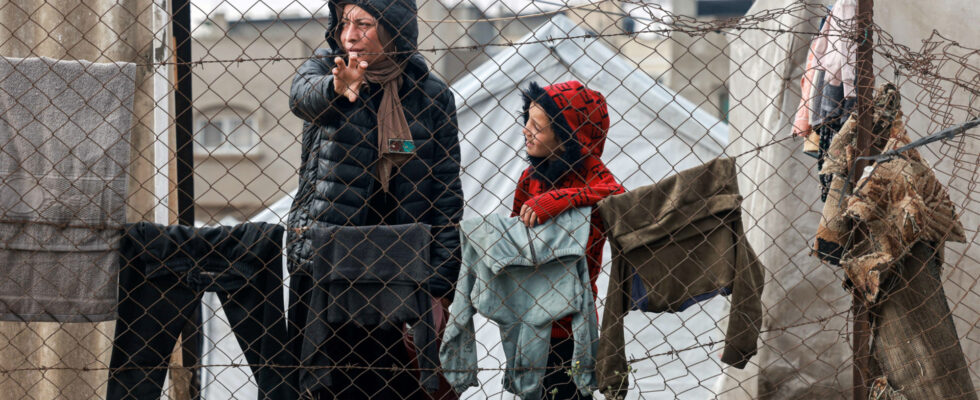The head of Israeli intelligence, the Prime Minister of Qatar and Egyptian officials were to meet Monday in Doha to discuss a possible truce agreement in Gaza, a source close to the negotiations told AFP. According to the American site Axios, “positive” discussions did take place and Israeli negotiators will remain in Doha to continue “detailed” talks with the Qatari and Egyptian mediators.
Towards a partial withdrawal of the Israeli army from the Gaza Strip
The State Department, for its part, announced on Tuesday that the head of American diplomacy, Antony Blinken, would travel to Saudi Arabia on Wednesday and to Egypt on Thursday in the hope of resolving the situation. The entire population of Gaza is experiencing a “serious food insecurity situation”, Antony Blinken also declared this Tuesday, citing UN data, during a press conference in the Philippines, where he is in official visit.
“By the most respected measure, 100% of Gaza’s population is severely food insecure. This is the first time an entire population has been so classified,” said the Secretary of State. American state, emphasizing the urgency of delivering more humanitarian aid to the Palestinian territory.
Israel announced on Friday the sending of a delegation to Doha, without specifying the date, after what appears to be a change in the position of Hamas saying it is ready for a six-week truce after having long requested a ceasefire. final. “We have accepted that there will be a partial withdrawal from the Gaza Strip before any exchange, and after the first stage, a total withdrawal,” said one of the Hamas leaders, Osama Hamdan, on Monday. “During the first stage, there will be a total cessation of military operations,” he added, referring to discussions which could continue for “a few days”.
Hostage list
One of the sticking points in the talks is the status of the hostages and the identity of the Palestinian prisoners to be released. Some 130 hostages from October 7 are still detained in Gaza, 32 of whom are believed to have died, according to Israel, which is demanding from Hamas a precise list of hostages still alive. However, the Palestinian Islamist movement says it does not know who is “alive or dead” among the hostages and asks for its part to be able to decide the identity of the main Palestinian prisoners to be released.
Israeli Prime Minister Benjamin Netanyahu is under pressure from the hostage families, who are urging him to accept an agreement, and from far-right members of his government, hostile to the release of a large number of Palestinian prisoners.
The road to Rafah
In a first telephone interview in just over a month with US President Joe Biden, Benjamin Netanyahu reaffirmed Monday that he was determined to “achieve all the objectives of the war” in Gaza including “the elimination of Hamas” . Despite international pressure, Israel is preparing for a ground operation in Rafah, a city where, according to the UN, there are nearly 1.5 million Palestinians, most of them displaced people. Early Tuesday, Hamas reported 78 deaths in the evening and night in Gaza, including 15 people at a residence in Rafah.
A major ground offensive there would be “a mistake”, declared American national security adviser Jake Sullivan, assuring that Israel would not launch an operation before holding, “in the coming days”, discussions on the subject. President Biden has requested that an Israeli delegation be sent to Washington to discuss “ways to target Hamas without carrying out a large ground offensive in Rafah,” he wrote on X (formerly Twitter), saying wishing for a break of “several weeks in the fighting” as part of an agreement to free the hostages and increase “aid” to Gaza.
“Impending famine”
The major humanitarian catastrophe caused by the war and the famine which is taking shape in the north of the besieged territory are causing growing concern. Israel has imposed a total siege on the Gaza Strip since the start of the war and controls the entry of humanitarian aid. This aid arrives mainly from Egypt via Rafah, but remains very insufficient given the immense needs of the population. It reaches with great difficulty in the north, where more than 300,000 people currently live according to the UN.
One in two inhabitants in Gaza, or more than 1.1 million people, are experiencing a “catastrophic” food situation, particularly in the north, UN agencies warned on Monday, the head of the World Food Organization Health, Tedros Adhanom Ghebreyesus, speaking of an “imminent famine”. Gaza has become an “open-air cemetery”, argued the head of diplomacy of the European Union, Josep Borrell, adding that “starvation (was) used as a weapon of war”.
The north of Gaza also witnessed on Monday violent fighting accompanied by bombings, around and in the grounds of the al-Chifa hospital, the most important in the territory located in the heart of Gaza City which the army had taken from assault on November 15 before withdrawing. The Israeli army claimed to have killed dozens of Palestinian fighters on Monday and to have arrested “more than 200” in this operation, claiming to have “information” according to which “senior officers” of Hamas were using weapons again. places for military purposes. Moreover, Washington confirmed the death last week of the deputy head of the armed wing of Hamas, Marwan Issa, the highest ranking officer in the organization killed since the start of the war.
